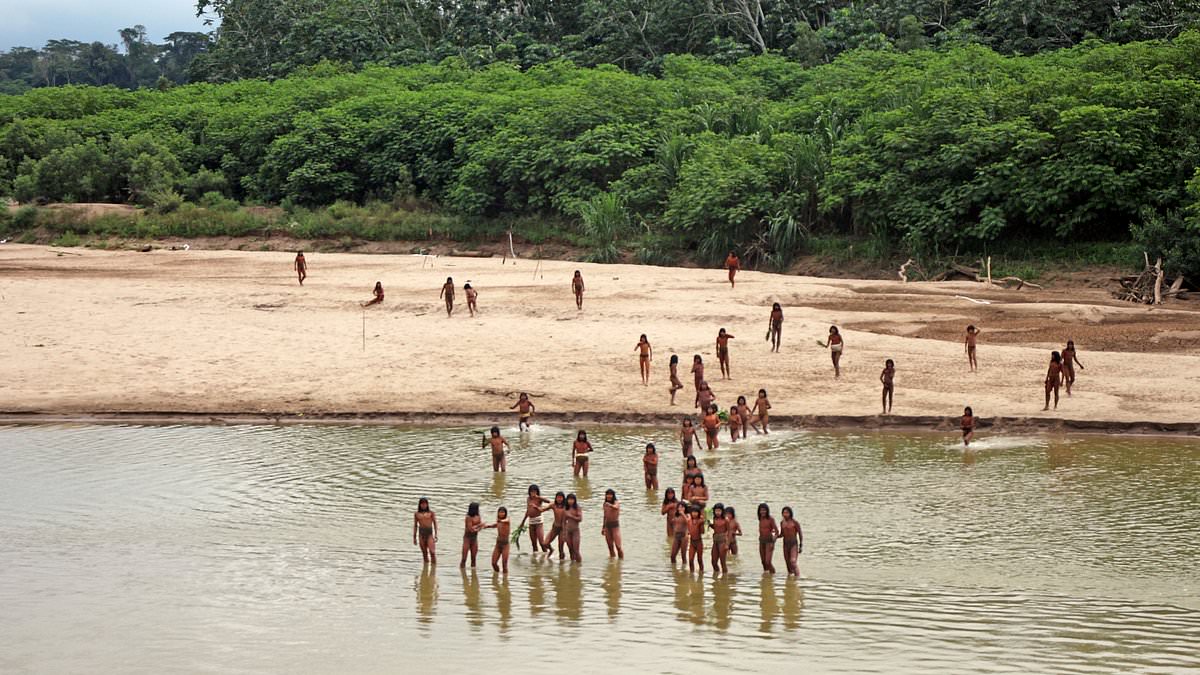Members of an ‘uncontacted’ Amazon indigenous tribe used bows and arrows to attack loggers in a fight that left at least one person injured.
The violent clash comes just weeks after the group known as the Mashco Piro were sighted brandishing spears on the banks of a river in remote Peru.
Campaigners have warned the tribe, who are believed to be the largest uncontacted group in the world, are under siege from logging activity that is disrupting their rainforest home.
The fight took place in an illegal logging camp outside their Madre de Dios territorial reserve along the Pariamanú River on July 27, a local indigenous organisation has said.
Further details, however, remain unclear and there are unconfirmed reports two loggers may have been killed.
Teresa Mayo, Peru researcher for Survival International, an NGO that supports Indigenous groups, said the clash occurred in an area of rainforest that is not formally protected by the government, although it is considered to be Mashco Piro territory.
The incredible video, which was released by Survival International last month, shows around 50 men and boys standing on the dusty riverside in loincloths with hair long and bare feet chalky from the rough ground.
The group is stood around in small clusters, some jogging to pick up large spears resting in the dirt. Others talk and gesture to each other and help carry objects along the river.
‘These incredible images show that a large number of isolated Mashco Piro live alone a few miles from where the loggers are about to start their operations,’ said Survival International director Caroline Pearce at the time.
The Mashco Piro have seldom appeared as a rule and do not communicate much with anyone, according to the NGO.
Several logging companies hold timber concessions inside the territory inhabited by the Mashco Piro.
One company, Canales Tahuamanu, has built more than 200 kilometers (120 miles) of roads for its logging trucks to extract timber, according to Survival International.
The company is certified by the Forest Stewardship Council, according to which it has 53,000 hectares (130,000 acres) of forests in Madre de Dios to extract cedar and mahogany.
In 2022, members of the Mashco Piro tribe shot two Catahua workers with bows and arrows while fishing on the Tahuamanu River, killing one.
Survival International is now calling on the Forest Stewardship Council (FSC) to withdraw its certifications of Catahua’s operations – and petitoning for support to help protect uncontacted tribes.
The Mashco Piro have also been sighted across the border in Brazil, said Rosa Padilha, at the Brazilian Catholic bishops’ Indigenous Missionary Council in the state of Acre.
‘They flee from loggers on the Peruvian side,’ she said.
‘At this time of the year they appear on the beaches to take (Amazon turtle) eggs. That’s when we find their footprints on the sand. They leave behind a lot of turtle shells.
‘They are a people with no peace, restless, because they are always on the run,’ Padilha said.
There are more than 100 uncontacted tribes around the world, according to Survival, but many today face extinction due to habitat destruction from outsiders.
It warns the Peruvian government still has not signed into law several indigenous territories which these groups rely on for their survival.
There are similar fears for tribes on the other side of the world. In Indonesia, the Hongana Manyawa face expulsion from their home atop the world’s largest nickel deposit on Halmahera Island.
Some came out of isolation for the first time to ask miners for food as they cleared their way through forest to make way for new mines.
Survival International warned they do not know for how long the tribe will be able to survive after the encounter.
Contact with outsiders can be life threatening due to exposure to new diseases isolated people would not have developed resistance to.
